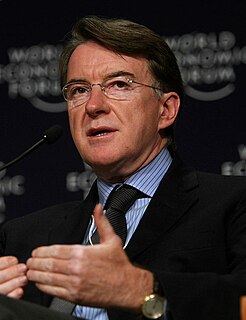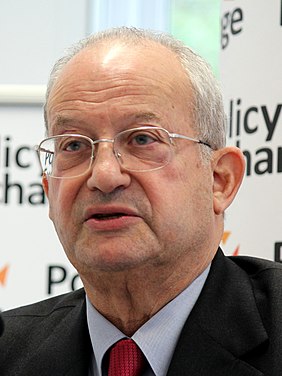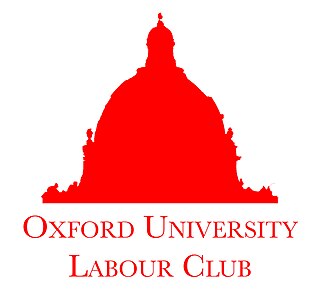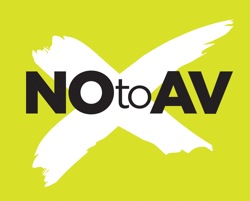
Peter Benjamin Mandelson, Baron Mandelson is a British Labour politician who served as First Secretary of State from 2009 to 2010. A member of the Labour Party, he was President of the Board of Trade in 1998 and from 2008 to 2010. He is the president of international think tank Policy Network, honorary president of the Great Britain–China Centre, and chairman of strategic advisory firm Global Counsel. Mandelson is often referred to as a Blairite.

Alan Milburn is a British Labour politician who was Member of Parliament (MP) for Darlington from 1992 to 2010. He served for five years in the Cabinet, first as Chief Secretary to the Treasury from 1998 to 1999, and subsequently as Secretary of State for Health until 2003, when he resigned. He briefly rejoined the Cabinet as Chancellor of the Duchy of Lancaster in order to manage Labour's 2005 re-election campaign. He did not seek re-election in the 2010 election.

Stephen Twigg is a British Labour Co-op politician who was Member of Parliament for Enfield Southgate from 1997 to 2005, and for Liverpool West Derby from 2010 to 2019.

David John Sainsbury, Baron Sainsbury of Turville, HonFRS, HonFREng, is a British politician, businessman and philanthropist. From 1992 to 1997, he served as the chair of Sainsbury's, the supermarket chain established by his great-grandfather John James Sainsbury in 1869.

Jon Hedley Trickett is a British Labour politician who has been the Member of Parliament (MP) for Hemsworth in West Yorkshire since a 1996 by-election. He was Shadow Lord President of the Council from 2016 to 2020 and served as Shadow Minister for the Cabinet Office from 2011 to 2013 and 2017 to 2020. He was the Labour Party National Campaign Coordinator under Jeremy Corbyn from 2015 to 2017.

Wendy Alexander is a retired Scottish politician and the former Member of the Scottish Parliament (MSP) for Paisley North. She held various Scottish Government cabinet posts and was the Leader of the Scottish Labour Party from 2007 to 2008. In 2010–2011 she convened the Scotland Bill Committee on financial powers of the Scottish Parliament.

Edward Samuel Miliband is a British politician serving as Shadow Secretary of State for Business, Energy and Industrial Strategy since 2020, and as Member of Parliament (MP) for Doncaster North since 2005. He was previously Leader of the Labour Party and the Leader of the Opposition between 2010 and 2015, resigning after Labour's defeat at the 2015 general election. Alongside his brother, Foreign Secretary David Miliband, he served in the Cabinet from 2007 to 2010 under Prime Minister Gordon Brown.

Falkirk is a county constituency of the House of Commons of the Parliament of the United Kingdom. It was created for the 2005 general election, replacing Falkirk West and part of Falkirk East. At the 2015 general election, it was the seat with the largest majority for the SNP as well as the seat with the largest majority for any party in Scotland. At the 2019 general election it again had the highest numerical majority of any SNP-won seat in Scotland, although other seats, including Aberdeen North, had higher majorities in percentage terms.

Patrick Bosco McFadden is a British politician who has been Member of Parliament (MP) for Wolverhampton South East since 2005. A member of the Labour Party, he was briefly Shadow Secretary of State for Business, Innovation and Skills in 2010 and Shadow Minister for Europe from 2014 to 2016 under Ed Miliband and Jeremy Corbyn.

Oxford University Labour Club (OULC) was founded in 1919 to promote democratic socialism and is today the home of the Labour Party and of social democracy at Oxford University. OULC is the largest and oldest university Labour club in the country and has a particular reputation as an active campaigning force.

LGBT+ Labour, the Labour Campaign for Lesbian, Gay, Bisexual and Transgender Rights, is a socialist society related to the Labour Party in the United Kingdom. Originally called the Gay Labour Group, the purpose of this organisation is to campaign within the Labour Party and wider Labour movement to promote the rights of lesbian, gay, bisexual and transgender (LGBT) peoples, and to encourage members of the LGBT community to support the Labour Party.

Political funding in Australia deals with political donations, public funding and other forms of funding received by politician or political party in Australia to pay for an election campaign. Political parties in Australia are publicly funded, to reduce the influence of private money upon elections, and subsequently, the influence of private money upon the shaping of public policy. After each election, the Australian Electoral Commission distributes a set amount of money to each political party, per vote received. For example, after the 2013 election, political parties and candidates received $58.1 million in election funding. The Liberal Party received $23.9 million in public funds, as part of the Coalition total of $27.2 million, while the Labor Party received $20.8 million.
Political funding in the United Kingdom has been a source of controversy for many years. Political parties in the UK may be funded through membership fees, party donations or through state funding, the latter of which is reserved for administrative costs. The general restrictions in the UK were held in Bowman v United Kingdom to be fully compatible with the European Convention on Human Rights, article 10.

The United Kingdom Alternative Vote referendum, also known as the UK-wide referendum on the Parliamentary voting system was held on Thursday 5 May 2011 in the United Kingdom (UK) to choose the method of electing MPs at subsequent general elections. It occurred as a provision of the Conservative–Liberal Democrat coalition agreement drawn up in 2010 and also indirectly in the aftermath of the 2009 expenses scandal. It operated under the provisions of the Parliamentary Voting System and Constituencies Act 2011 and was the first national referendum to be held under provisions laid out in the Political Parties, Elections and Referendums Act 2000.

Ed Miliband became Leader of the Labour Party and Leader of the Opposition upon being elected to the former post on 25 September 2010. The election was triggered by Gordon Brown's resignation following the party's fall from power at the 2010 general election, which yielded a Conservative – Liberal Democrat Coalition. Miliband appointed his first Shadow Cabinet in October 2010, following the Labour Party's Shadow Cabinet elections. These elections were the last such elections before they were abolished in 2011.

NOtoAV was a political campaign in the United Kingdom whose purpose was to persuade the public to vote against the Alternative Vote (AV) in the referendum on 5 May 2011. NOtoAV was successful in maintaining the current voting system having received 67.9% of votes cast.

Iain Mackenzie McNicol, Baron McNicol of West Kilbride is a British Labour politician and trade unionist. From 2011 to 2018 he was General Secretary of the Labour Party. Previously he was National Political Officer of the GMB Union.

The Purple Book: A Progressive Future For Labour is a 2011 collection of essays by politicians in the UK's Labour Party, many of whom are considered to belong to the Blairite wing of the party. The book was conceived and promoted by Progress. It has been compared to The Orange Book: Reclaiming Liberalism, published seven years earlier by then-leading members of the UK's Liberal Democrats.

In 2013, Eric Joyce, Member of the House of Commons of the United Kingdom for Falkirk, resigned from the Labour Party and announced he would not seek re-election. The process of nominating a replacement candidate for the 2015 General Election led to a dispute between the party and its major financial backer Unite the Union, causing the suspension of two local party members, the resignation of Tom Watson MP as Labour's 2015 election strategist, and the forwarding of an internal report into the situation to Police Scotland.
Labour First is a British political organisation associated with the British Labour Party, originally founded in 1980, but refounded in 1988. Born out of Labour's struggles with the left of the party, it sees itself as protecting the tradition of the "old Labour right". It organises petitions, endorses likeminded candidates, and runs events.


















